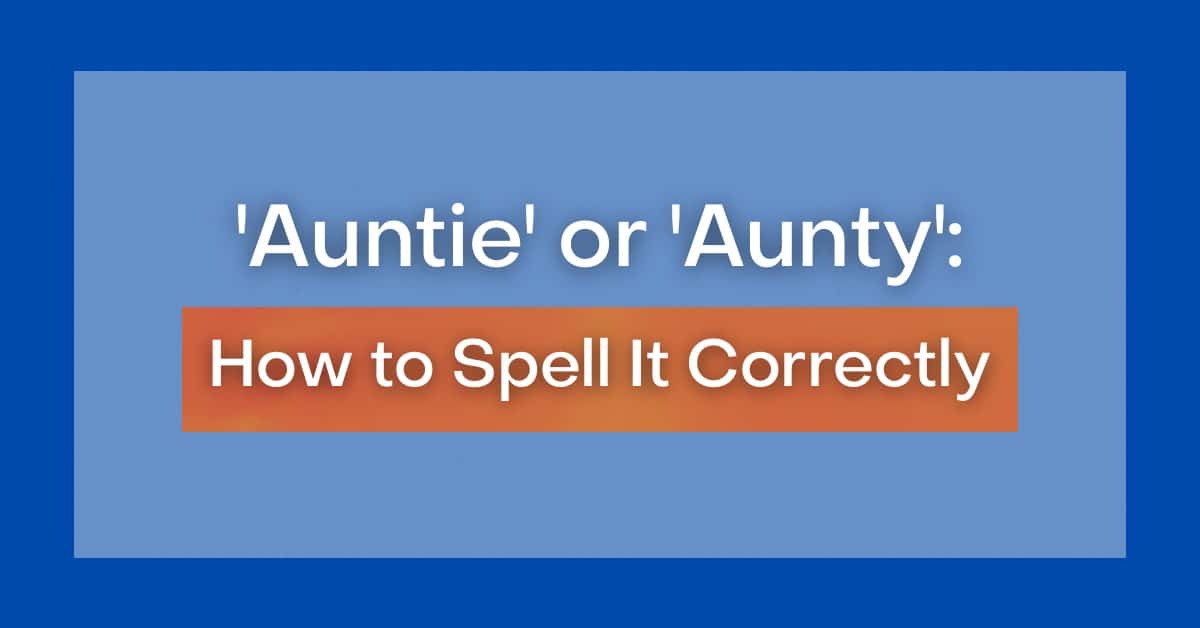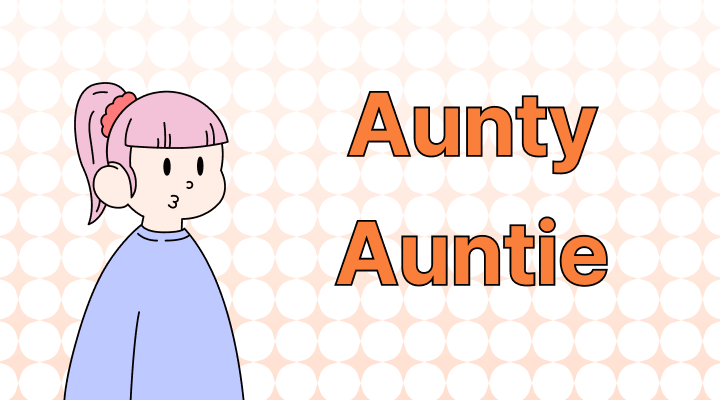"Aunty" and "auntie" are both correct and are informal terms used to refer to one's aunt, a female sibling of one's parent, or a term of affectionate address for a woman who is like an aunt. Auntie is more commonly used in both British and American English.
While these words are similar and share a common meaning, they have distinct variations in spelling and regional usage.
What does aunty mean?
"Aunty" is a colloquial, informal term used to address or refer to one's aunt, a sister of one's parent. It is a common variant of the word "auntie," with a slightly different spelling. In many English-speaking regions, especially in informal conversations and among children, "aunty" is a warm and affectionate way to address one's aunt.
Example sentence
- "I love spending time with my Aunty Jane. She tells the best stories."
What does auntie mean?
"Auntie" is also an informal term used to address or refer to one's aunt. It is the more widely recognized and accepted variant of the word. Like "aunty," "auntie" is an affectionate way to refer to a beloved aunt, and it is commonly used in both British and American English.
Example sentence
- "Auntie Sarah is coming over for dinner tonight. I can't wait to see her."
Differences in spelling
The primary difference between these two terms lies in their spelling. "aunty" uses the letter "y," while "auntie" uses the letters "e" and "i."
Example sentences
- My Aunty/Auntie Mary makes the best homemade apple pie.
- Aunty/Auntie Susan taught me how to ride a bike when I was a child.
- We're going to visit Aunty/Auntie Emily during the summer vacation.
- Aunty/Auntie Lucy always tells the most fascinating stories from her travels.
- My youngest cousin adores our Aunty/Auntie Jane; they share a special bond.
- Aunty/Auntie Sarah is coming over for dinner tonight, and she's bringing her famous lasagna.
- I spent the weekend with my aunty/auntie in the countryside, and it was so peaceful.
- Aunty/Auntie Linda is a talented pianist, and I love listening to her play.
- Aunty/Auntie Grace gave me a beautiful necklace for my birthday.
- Whenever I have a problem, I know I can turn to my aunty/auntie for advice and support.
Common Idioms/Phrases
- Auntie/Aunty's Advice: Refers to the guidance and wisdom often provided by a caring aunt.
- Example: "I sought auntie/aunty's advice when making a major life decision, and it was invaluable."
- Auntie/Aunty's Helper: Describes someone who assists or supports their aunt, often used humorously.
- Example: "Little Timmy is auntie/aunty's helper in the garden. He loves planting flowers with her."
- Auntie/Aunty Treasure: Signifies something special or cherished that one receives from their aunt.
- Example: "This locket was auntie/aunty's treasure. She gave it to me before she passed away."
Is aunty/auntie capitalized?
The capitalization of "aunty" or "auntie" depends on the specific style guide or language conventions you are following. In many informal contexts, "aunty" or "auntie" is not capitalized when used as a term of endearment or informally to refer to a person's aunt. For example:
- I'm going to visit my aunty Lisa.
In this case, "aunty" is not capitalized because it is used informally. However, if you are using it as part of a proper noun or in a formal or respectful manner, you may choose to capitalize it. For example:
- Auntie Jane hosted the family reunion.
In this case, "Auntie" is capitalized because it is used as part of the person's name and in a somewhat formal context.
Ultimately, whether you capitalize "aunty" or "auntie" depends on your style and the specific context in which you are using it. Always check and follow the relevant style guide or conventions you are using for consistency.
Understanding the difference between "aunty" and "auntie" can help you use these terms appropriately when addressing or referring to your beloved aunts. While both convey warmth and affection, "auntie" is the more standard and widely recognized spelling, while "aunty" may be considered a regional variation. Whether you choose "aunty" or "auntie," these terms celebrate the special bond between nieces, nephews, and their aunts.
Want to sound like a native speaker?
Engram’s AI-powered grammar checker makes your English sound like a native speaker’s, suggesting natural English expressions on top of fixing grammar, spelling, punctuation, word order, and vocabulary.















